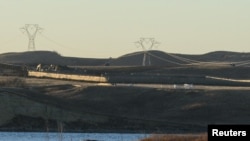The company building the Dakota Access oil pipeline said it plans to resume work immediately to finish the long-stalled project.
The Army on Wednesday granted the developer of the four-state oil pipeline formal permission to lay pipe under a Missouri River reservoir in North Dakota, clearing the way for completion of the $3.8 billion project.
“We plan to begin immediately,’’ Vicki Granado, a spokeswoman for developer Energy Transfer Partners, said in an email to The Associated Press Wednesday night.
Work had been stalled for months by opposition by the Standing Rock Sioux, but President Donald Trump last month instructed the Army Corps of Engineers to advance pipeline construction.
Tribe vows to fight in courts
Standing Rock Sioux Tribal Chairman Dave Archambault said in a statement Wednesday that the tribe is prepared to keep battling the pipeline “in the courts.”
“We will continue to fight against an administration that seeks to dismiss not only our treaty rights and status as sovereign nations, but the safe drinking water of millions of Americans,” the chairman said.
The Standing Rock Sioux fears a pipeline leak could contaminate its drinking water. ETP says the pipeline is safe.
Gov. Doug Burgum released a statement Wednesday, asking for “everyone’s cooperation and restraint to ensure that the pipeline is completed in a safe manner.”
Burgum also called on federal officials to send extra law enforcement resources to help local authorities “in keeping the peace during construction.”
Protests around country
Protesters held rallies in several cities across the country. A group of demonstrators in Chicago targeted a bank, and another group went to an Army Corps of Engineers office in New York City but was asked to leave when they started filming without a permit. Several people were arrested for blocking public access to a federal building in San Francisco.
Joye Braun and Payu Harris, two pipeline opponents who have been at a North Dakota encampment that’s been the focus of the pipeline battle since April, said in an interview at a nearby casino that there’s frustration but also resolve in the wake of the Army’s decision.
“The goal is still prayerful, nonviolent direct action,” Braun said.
The tribe maintains the decision violates its treaty rights, and its attorneys have vowed to keep fighting in court.
Pipeline nearly complete
The nearly 1,200-mile pipeline would carry North Dakota oil through the Dakotas and Iowa to a shipping point in Illinois. Construction is nearly complete but has been stalled while the Corps and Dallas-based developer Energy Transfer Partners battled in court over the final segment.
The Standing Rock Sioux, whose reservation is just downstream from the crossing, led protests last year that drew thousands of people to the encampment near the crossing. Protesters and police sometimes clashed, leading to nearly 700 arrests.
The Corps has notified remaining protesters that the government-owned land will be closed February 22. But according to Harris, a new camp is being established on private land.
“This is not over. We are here to stay. And there’s more of us coming,” he said.
An assessment conducted last year determined the river crossing would not have a significant effect on the environment. However, the Army in December decided further study was warranted to address tribal concerns.
The Corps launched a study January 18, but Trump signed an executive action six days later telling the Corps to proceed with construction.
Workers earlier drilled entry and exit holes for the crossing, and oil has been put in the pipeline leading up to the lake in anticipation of finishing the project. CEO Kelcy Warren has said the work could be done in about three months.





